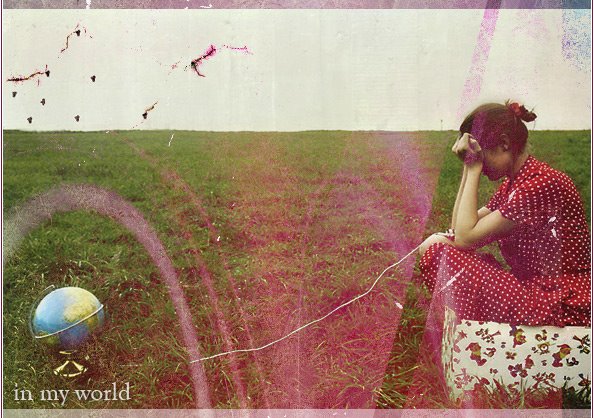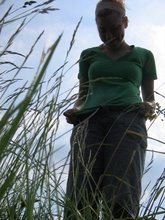Saturday, July 31, 2010
and i laugh
Tuesday, July 27, 2010
Blancetville
Blancetville tastes like metal. My tongue grazes the roof of my mouth and along my lips, and I taste its distinct flavor. The faces here are sad and drained. There is too much iron in their skin weighing them down. We all feel weighed down as soon as we arrive, and we leave with lead in our hearts. Blancetville leaves us wanting. It’s easy to grow old here, even while I am very young.
Blancetville used to be a farm town, but there is little agriculture left. I wonder what the water has done to the land. The soil here is made of clay; crops struggle to take root and too often drown. When the rain comes, it puddles and ponds in fallow fields, and in the spring, just before it is time to plow, the dormant land on the outskirts of town grows wild with row after row of yellow mustard.
Daylight lasts longer than on the east coast. In the summertime night doesn’t come till nine or ten o’clock. There is something eerie in getting tired before the sun. We all try to outlast it, but we yawn into the sunset and stay awake just long enough to see the fireflies come out. The fireflies give us something to talk about. Something to hope for.
I can imagine my father growing up here. I can see him at six —sharp, independent, sly—riding around town on his bicycle, speeding past the long stretches of field that overwhelm the landscape, racing time to escape its toll. I see him twelve years old, golf clubs bound to the front of his bicycle, making his way to the junior country club to play a round with his pals. Or at age fourteen, coaching the Little League. It’s best to appreciate Blancetville through the eyes of someone else, someone too familiar with it to recognize its flaws, or at least familiar enough to forgive them.
We were there to visit. First my father’s parents, then my mother’s. It’d been a long time since I’d driven down the long straight roads. I learned to drive in this town, but once I learned I got behind the wheel and didn’t come back too often. There were too many other vacations to take, and I preferred roads in the mountains, places that kept me feeling young.
We sat around the kitchen table, drumming our fingers, waiting. There were five of us, each biding our time in different ways. Ethel made excuses for her son, and busily cleaned up after us. Randal, thankful this was not his problem, found ways to complain about it anyway. He may have married Ethel, but that didn’t make her son his. Debbie kept close to Ethel, coveting the rare time with her mother. My father and I left for a walk, hoping the time to leave would come soon. We casually placed bets on whether he would come at all.
Dean made his way in two hours late. I hadn’t seen him in fifteen years, and I looked him up and down with my critical New England eye. He sat with Debbie and Ethel, telling stories about his children, some of whom he hadn’t seen since his divorce. I looked for signs of myself in his face, but I could only see my brothers’ bone structure and gaunt build, my grandfather’s ears, Ethel’s nose. His hair, long and curly down his back, had dulled and greyed, but his thick mustache still burned. His skin freckled and tanned in the sun. There was no question he and Debbie were siblings, though the youthful joy in her eyes made her look the younger. No one would guess that she was the first, that she was ten years his senior. Dean wore time on his face.
As he talked I watched his hands shaking ever so subtly. He had short fingers like Debbie’s, but I’ve never seen a man with such thick fingers. His nails were longer than mine. I wondered what time had done to him. I wondered if he was tired from all that driving at night.
He tore at Randal's sense of propriety: “A mahn outta be’n contrul of ‘is huss,” Randal, ninety-one, mumbled and paced, disrespected by Deans hair. We first met Randal ten years ago, after he married Ethel. They had both been widowed. Ethel seemed to carry on fine alone, but Randal needed a wife to tend to him. There has never been another woman whose hands work in such precision. She is capable of nearly anything. In the old house, the red one she and her first husband built, she rode a lawn tractor to mow her five acres across her first lawn, down into the ditch of the creek, across the bridge, and out into the second lawn, carefully navigating around the grape vines. Then she made grape pepper jam for all of us. Her strength was always in her hands, in her deeds.
When the mower needed to be repaired, she called Randal. That is how they met. One day, in her garage, he looked at her and declared to himself, “I’m gunna marry that woman.” Three months later, he did. That was the one weakness I saw in Ethel: she was easily had.
Randal was old. In every way, he was old. And, for all of his purposes, he was always right. Ethel lost all of her freedom when she married Randal. We all knew she had the advantage, but he was the winner. Every winter, he came down with pneumonia and lay down, waiting for death. It never came. Every winter, Ethel was not permitted to leave the house; he could not stand the thought of dying alone. Sometimes, her guests could not stay. Sometimes, even her own children were not permitted to stay. Randal is so old he is even missing parts. When he was young he went to work in a factory, and at some point he lost two of his fingers on his left hand. This dominated my first impression of him. I reached out to shake the hand of this alien new grandfather, and my hand cupped too few fingers to understand.
I sat as a child in the midst of years of tension. Dean, oblivious to anything other than the memories of his divorce. Debbie, finally sitting across from her brother. Ethel, loving her children and appeasing her second husband. Randal fuming. My father and I caught each others’ eye. Comrades. Randal escaped in the other room to his chair, feeding bitterly on his oxygen. Unsatisfied, he came back in, stood at the door, then at the wall, then by the sink, and back to his chair. I could hear his breathing thick and loud as though he was underwater, slowly losing control.
Ethel excused herself. From the other room I could hear Randal’s indignation. The sounds were mostly muffled, but I caught the key words. Dean had long hair. He did not look enough like a man. Dean was not a good enough man. Dean was late and he had long hair. Randal could not forgive such crimes. Men and women each had a proper place. Dean was out of place. I heard Ethel crying, “They’re here to visit me!” Quieted, but undeterred, Randal sat back in his chair. Ethel came back, blocking all troubles, listening to her son. She knew it had not been easy for him. She wished the way had been simpler. We all wished that for Dean.
In the midst of it, I looked up at my father. He may always be a bit of a mystery to me. I imagine at his funeral he will be missed by all, but understood by few—he is known for his silence and his boldness. His silence has often been maddening to me; but I have found that he is good at both creating tension and resolving it. Some of my favorite memories are of him smoothing away my nerves and fears. I find the most peace in his authoritative, subtle interceptions. His voice and reason enter the middle of an explosive situation and defuse it. I’ve come to trust his calm.
And so I watched him. Almost without thought he got up. He walked away from us without a word, went into the other room, and absorbed Randal’s storm. And Debbie sat with her brother and her mother. And I thought, by all comparison, my father is a very good man.
Monday, July 26, 2010
Friday, July 23, 2010
one thousand years old.
you, too, looked one thousand years old.
in them was my history and a future disregarded for older hopes.
i saw both beginnings and endings in that blue crystal,
your dark empty space staring into mine.
you read my history, and helped write it i suppose.
there are lines in these eyes carved out by you.
in such short breaths, we have tangled our tiny nerves in cracks and spaces;
lungs and ribs coming together from two different puzzles.
knotted, i leave and you come;
you stay and i follow.
we are neither there, nor here.
we are certainly not alone nor together.
we rip and break one another's bones,
adding more to replace what already didn't fit.
we are a bone pile, collected through these years.
such a long life to live in such a short amount of time.
you are my old soul,
and i, for a time, brought youth to your tired heart,
and you to mine,
until i could not take it any longer.
i, too, have grown an old soul.
i recognize life too well, though i have never lived it before.
you could not come, even if i asked you to.
there are the children in your heart to tend to.
and then there is this:
i can not be she whom you've dreamed of.
i do not belong in your dreams.
so i break your bones, give your old soul one more tear.
and you leave cracks and hollow caves in these lungs.
i look at those eyes and wonder how such a tender glance could leave such a hole.
but such a hole it left.
go now, make room for her. sweep out my dust,
don't save any in jars sitting on the window sill,
don't let her know what's written in those years, written deep in the cracked walls.
and i, too will go. i will run into the mountains, hidden, protected, healing,
quietly remembering those eyes.

